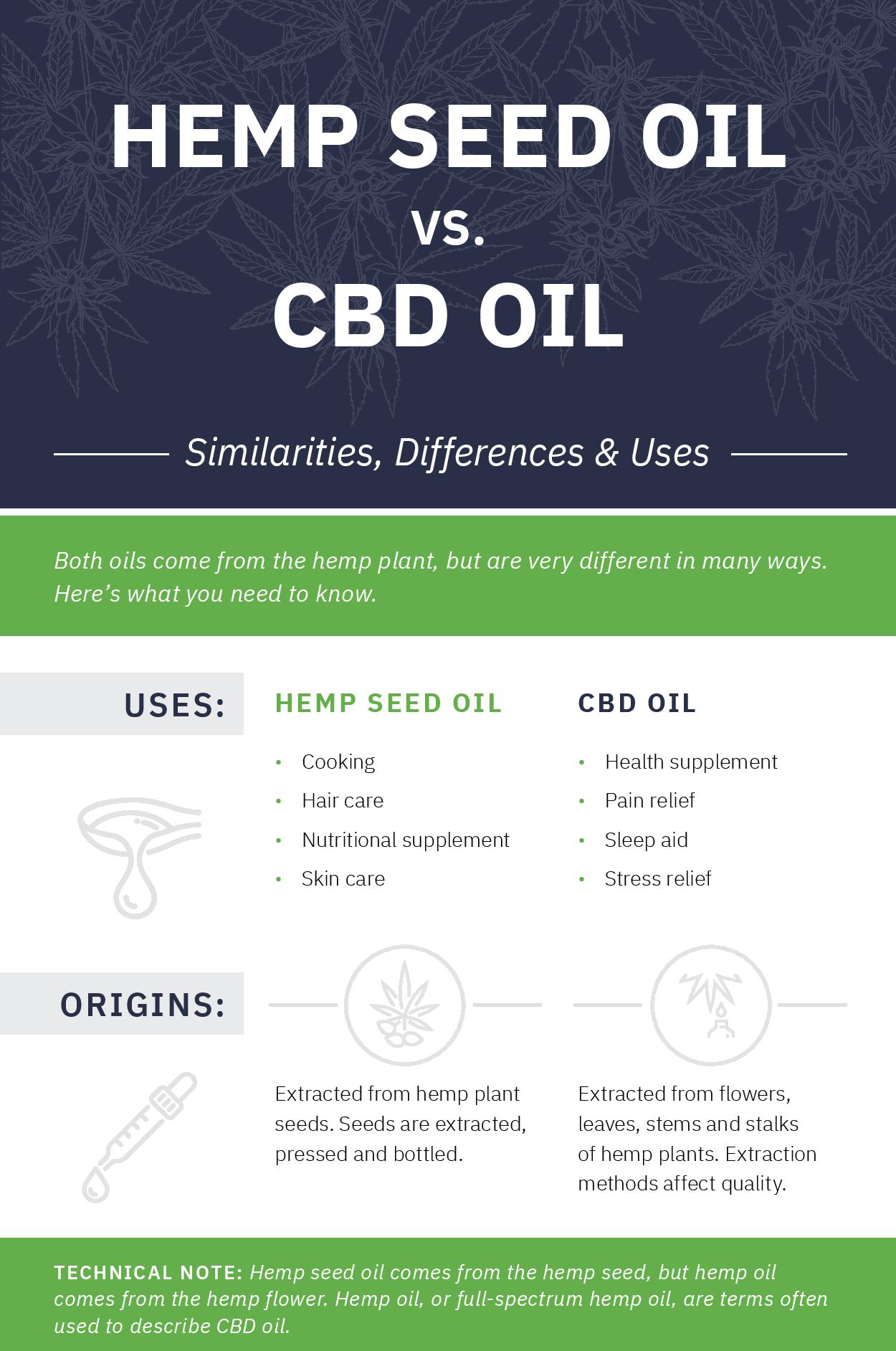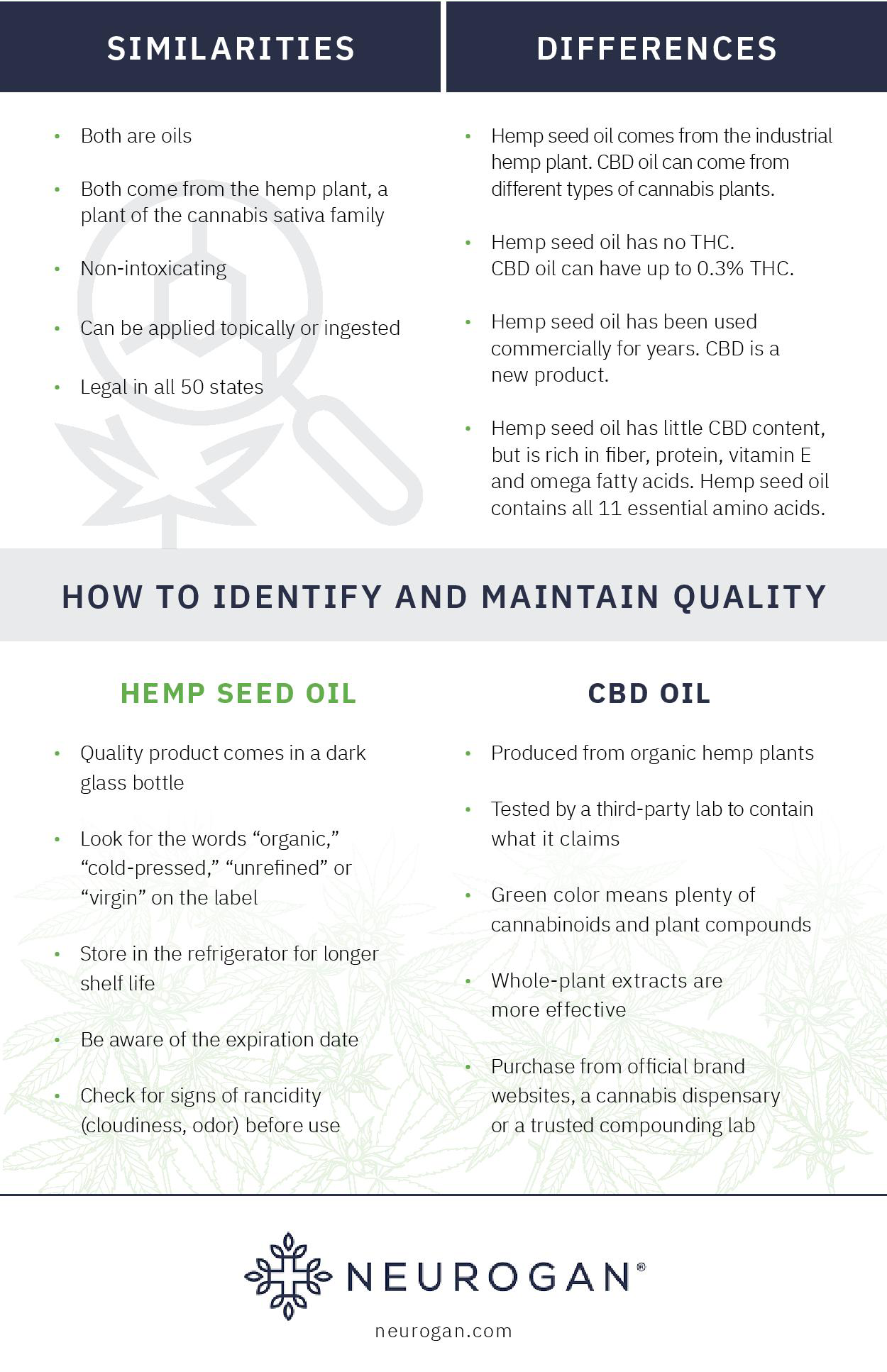Cannabidiol (CBD) has been a growing topic of interest since the FDA approved the first CBD-based drug in 2018. More people than ever are looking for CBD oil and interested in the many benefits that the hemp plant may offer. CBD oil and hemp seed oil often get confused. After all, they both hail from a similar source and look a lot alike. Here’s the rundown on the similarities and differences between the two.
Similarities Between Hemp Seed Oil and CBD Oil
Here’s why it’s often challenging to decipher between these two hemp-based oils:
- Hemp seed and CBD oil can be ingested or used on the skin: Ingesting CBD oil or hemp oil is the most common way to use either product — even if the reasons for doing so are extremely different. Hemp oil can be applied to the skin just the same as CBD oil. Most often, the oils are incorporated into carrier agents for topical use.
- CBD oil and hemp seed oil are not intoxicating: The only “intoxicating” cannabinoid known in the hemp plant is THC, which is present in fractional amounts. Hemp seeds are not known to contain high amounts of cannabinoids. The likelihood of finding THC is highly narrow. With CBD oil, products can only contain up to 0.03% THC legally — too small of an amount to feel fully intoxicated.
- Both oils are legal nationwide: Thanks to the fact that hemp-derived CBD has gained attention for proposed benefits, it is now legal to produce, distribute, and own in all 50 states in the U.S. Hemp seed oil, with little-to-no cannabinoid content, is also legal.

Differences Between Hemp Seed Oil and CBD Oil
While CBD oil and hemp seed oil obviously have similarities, the two are distinct for more than one reason:
- CBD oil and hemp seed oil have unique uses: Hemp seed oil is considered a food product by most. Though its nutritive benefits and antioxidants also land the oil in many health and beauty products for topical use. The oil may offer gastrointestinal support, deter skin issues, and support the heart. CBD oil is most often used for purported therapeutic advantages. For example, a growing number of people use CBD oil for supporting mood, a good night’s sleep, or for helping with focus.
- The origins of both oils are slightly different: Hemp seed oil is derived from the seeds of the hemp plant; harvested seeds are pressed to extract the oil. On the contrary, CBD oil is extracted from numerous parts of the mature hemp plant — including the stalks, leaves, stems, and flowers. The extraction process for CBD oil varies and can affect the end quality, purity, and content of the oil.
- Hemp seed oil has a longstanding history as a consumer product; CBD is new: Hemp seed oil has been around as a consumer product for quite some time. It’s been incorporated into everything from skin cream to prepackaged foods. However, it wasn’t until the Farm Bill passed in 2018 that CBD oil and other CBD-based products derived from hemp became legal nationwide.
- CBD oil is known for CBD content; hemp seed oil is known for nutritive content: CBD oil is recognized for the fact that it contains cannabidiol (CBD). The oil can also contain other hemp constituents, such as terpenes and flavonoids that may offer inherent advantages when paired with CBD. Hemp seed oil, on the other hand, is highly regarded for its nutritive content. The oil serves 11 amino acids; protein; fiber; and vitamins D, B, and E.

CBD Oil and Hemp Seed Oil: Two Closely Related Oils With Unique Compositions
Hemp has taken center stage as an interesting plant. There’s no doubt we’ll see many new facets of this plant as time continues. Even though hemp yields CBD oil and hemp seed oil, both products have unique compositions and benefits. By taking a closer look at the two, it’s easy to see how each is highly deserving of consumer attention. Both seem to support a natural state of well-being — albeit for reasons on opposite ends of a spectrum.
Author bio: Glory Rae Finnegan is content strategy manager and staff editor for Neurogan, a provider of CBD with Scandinavian roots. Finnegan has a bachelor’s degree and a master’s degree in Psychology. She is passionate about human psychology, destigmatizing mental health, animal advocacy, and plant-based living.
